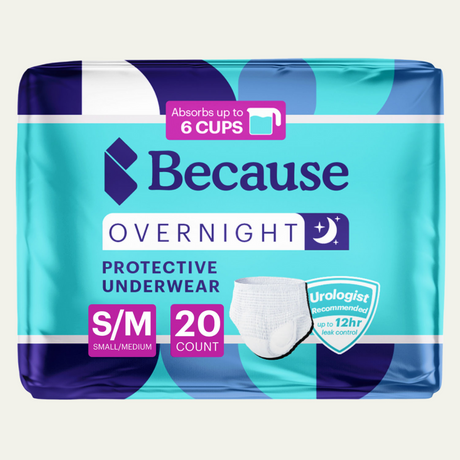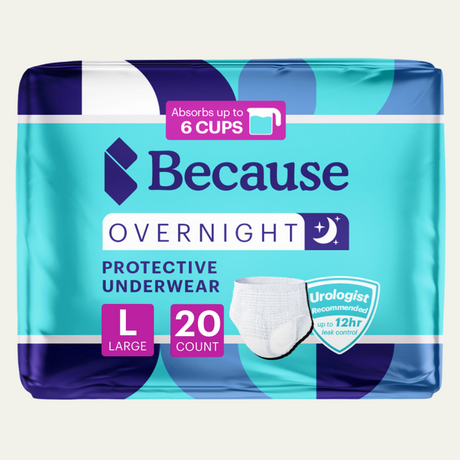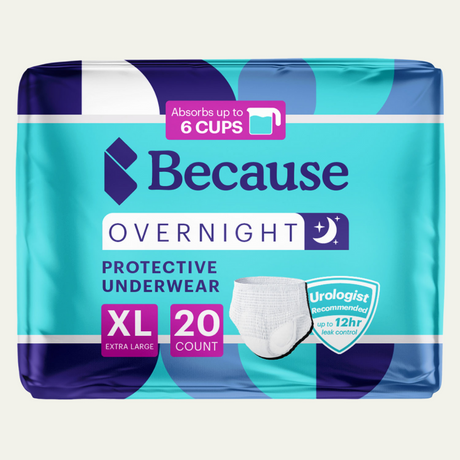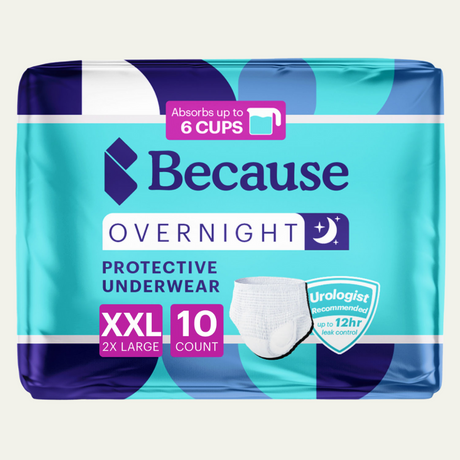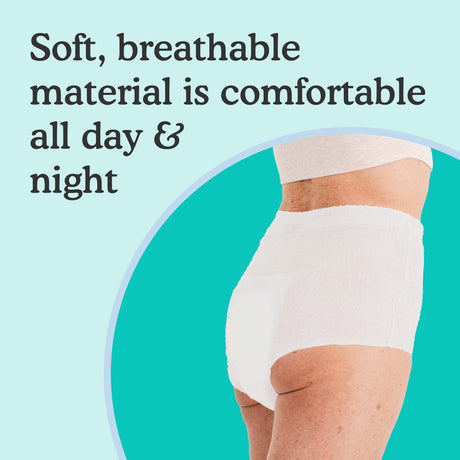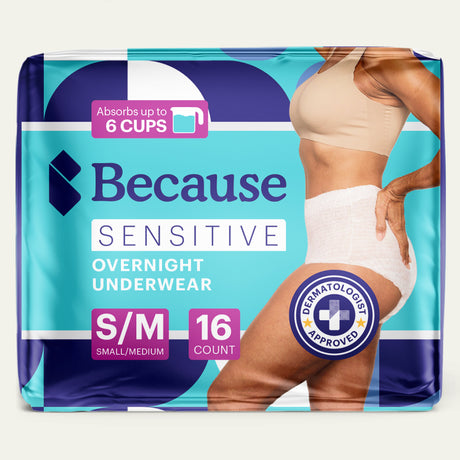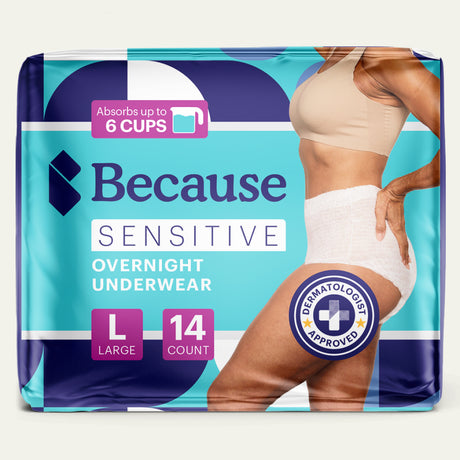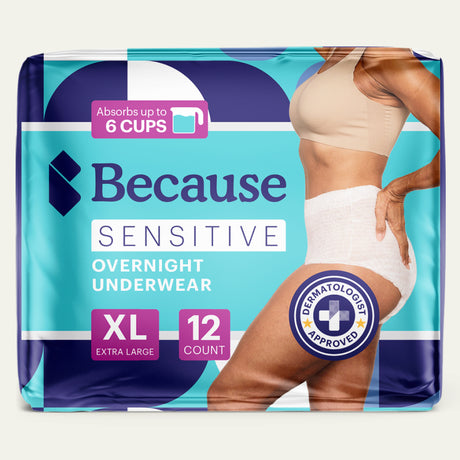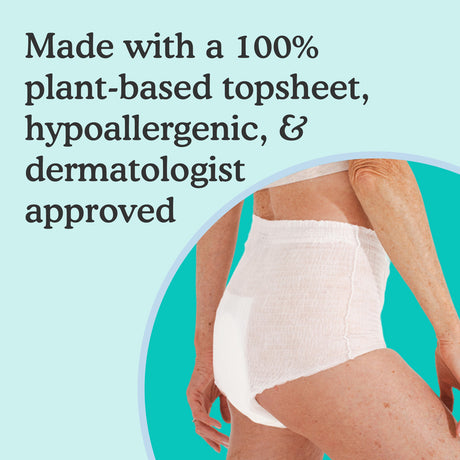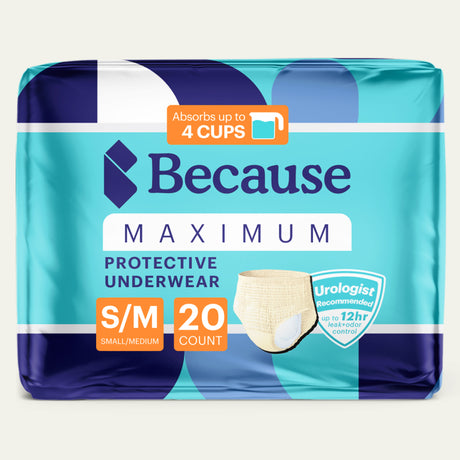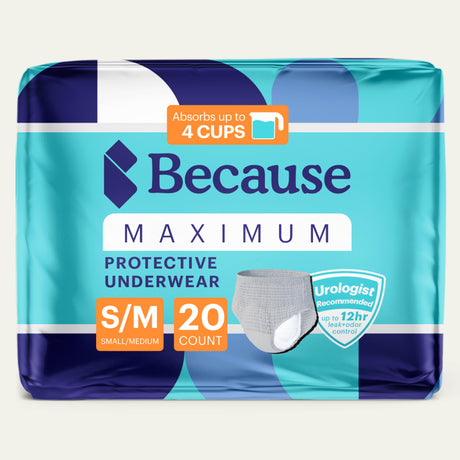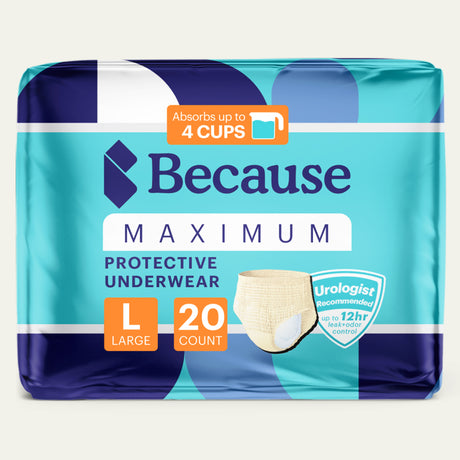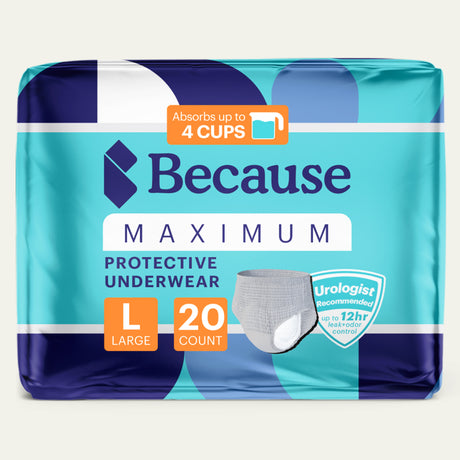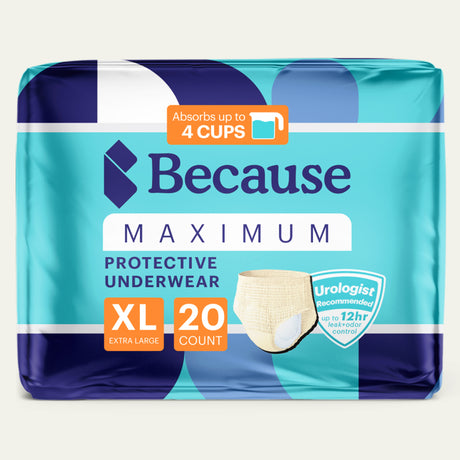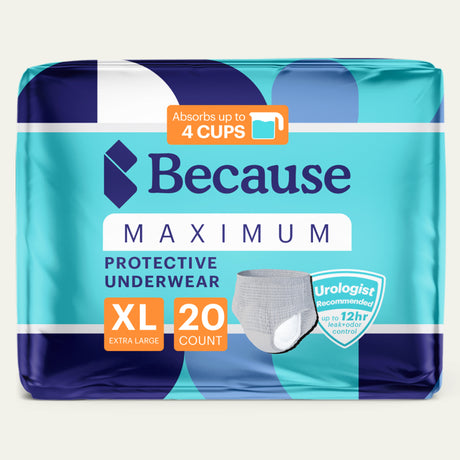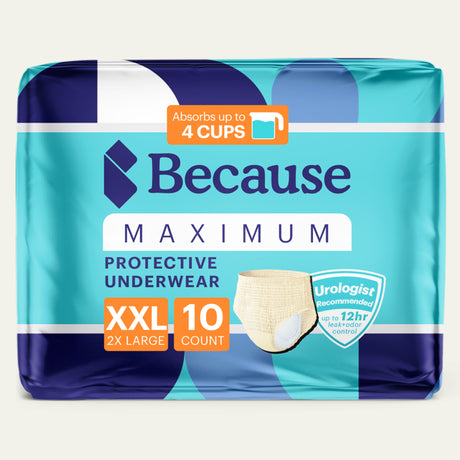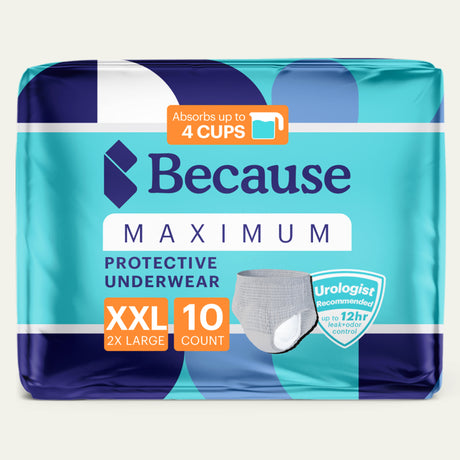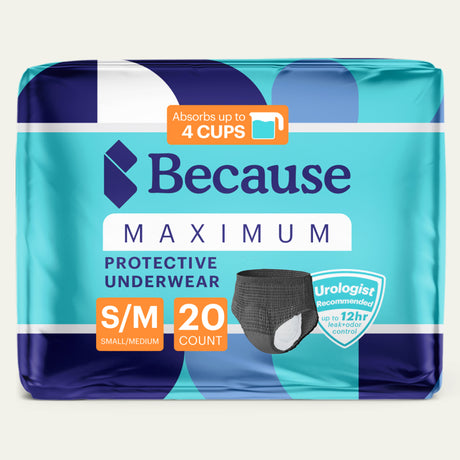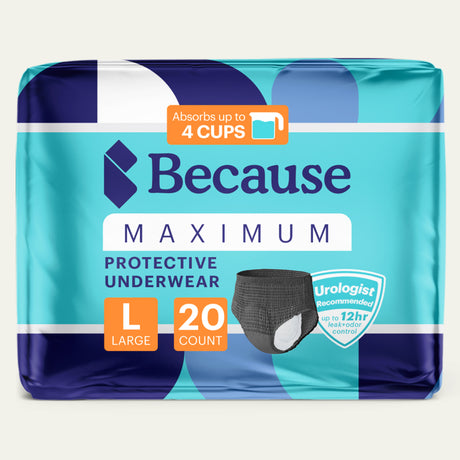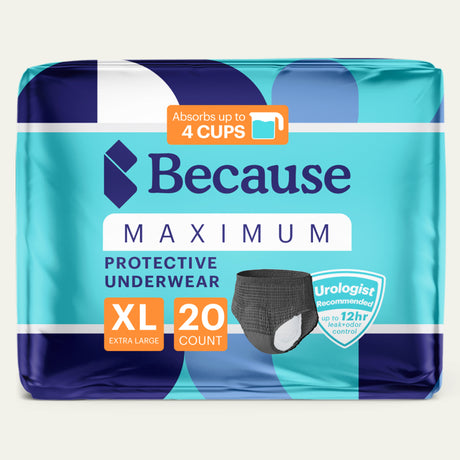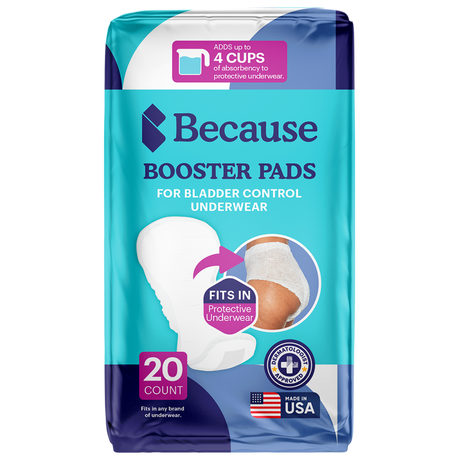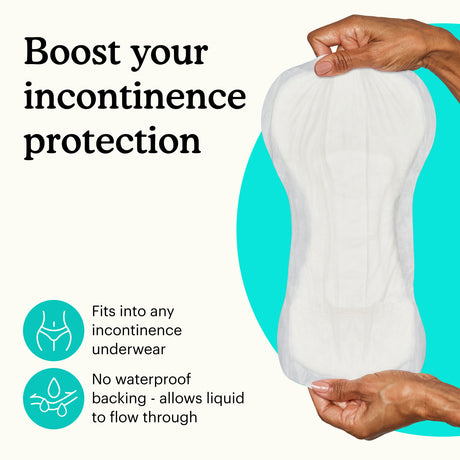Medically reviewed by Dr. Kerac Falk, MD, FACOG.
Do you find yourself making countless trips to the restroom throughout the day, rushing in the middle of the night, or sometimes just barely making it there in time? If so, you’re all too familiar with the challenges of overactive bladder.
Overactive bladder (OAB) is not just a mere inconvenience. The symptoms of an overactive bladder include sudden and uncontrollable urges to urinate accompanied by occasional leakage. They can leave one feeling vulnerable and self-conscious, taking a toll on self-esteem and overall well-being.
The causes of OAB range from age-related muscle weakening and recurring urinary tract infections to neurological conditions and more. Although prescription medications and medical procedures can help to manage OAB, many people prefer to explore non-invasive options first.
Overactive bladder home remedies offer effective relief from OAB symptoms and a sense of control and self-empowerment. Let’s explore ten natural strategies to help you regain control of your bladder naturally.

10 Home Remedies for Overactive Bladder
You can use the following overactive bladder home remedies on their own or in conjunction with an existing treatment plan to help you regain control and enjoy a more comfortable, confident life.
1. Maintain a Healthy Weight
Maintaining a healthy weight not only benefits your overall health but also has a positive impact on OAB symptoms. Extra weight around the abdomen can exert pressure on your bladder and pelvic muscles, making it harder for them to function optimally.
This added pressure on your bladder and pelvic floor leads to more frequent urges to urinate and increases the chances of leakage. Additionally, obesity and excess weight are often linked to chronic medical conditions, such as diabetes, which can further complicate OAB.
Shedding a few pounds and maintaining a healthier weight can substantially improve OAB symptoms and lower the risk of chronic disease. Lifestyle changes, like prioritizing a healthy diet and incorporating regular exercise are the best place to start. If you need personalized guidance on weight management, talk to your doctor or a qualified nutritionist.
2. Fluid Management and Proper Hydration
Dehydration can irritate the bladder lining, making OAB symptoms more pronounced. However, excessive fluid intake, especially right before bedtime, can lead to more frequent nighttime bathroom visits. Striking the right balance is vital to managing OAB effectively.
Consume most of your daily fluids earlier in the day to reduce the likelihood of nighttime bathroom trips. Aim to drink more in the morning and early afternoon and less in the evening. Sip fluids slowly and consistently rather than drinking a lot in a short period.

3. Limit Caffeine and Alcohol
For many of us, the day doesn’t officially start until we’ve had a cup of coffee. A glass of wine is often a favorite way to unwind in the evening. Unfortunately, if you’re dealing with overactive bladder, these beverages could contribute to your bladder control issues.
Caffeine and alcohol contribute to urge incontinence and OAB because they act as diuretics, which means they increase urine production. They can also lead to bladder irritation, further intensifying OAB symptoms. Caffeine can also stimulate bladder muscles, making it more difficult to control urges.
One of the most simple and effective overactive bladder home remedies is to reduce your intake of caffeine and alcohol and eliminate them completely in the late afternoon and evening. Replace caffeinated and alcoholic drinks with water, cranberry juice, or herbal teas to ensure you stay hydrated and support bladder health.
4. Establish a Regular Bathroom Schedule
Creating a consistent bathroom schedule can be a highly effective approach to managing OAB. Training your body to urinate at specific times can reduce the urgency and frequency of OAB episodes, improving comfort and confidence throughout the day.
Scheduling bathroom breaks reduces anxiety and helps to prevent overfilling of the bladder, decreasing the likelihood of sudden and uncontrollable urges. Begin by noting your typical bathroom habits, then create a schedule around those times. Consistency is key, so be sure to stick to your schedule, even if you don’t feel the immediate need to go.
Sticking to a bathroom schedule can be challenging, and it may take time to see significant improvements, but it’s worth the effort. Be patient with yourself and remember that this is just one piece of the puzzle to managing OAB naturally.
5. Practice Double Voiding
Residual urine that remains in the bladder after urinating can lead to bladder irritation, trigger OAB symptoms, and contribute to recurring UTIs. Double voiding centers around the simple concept of emptying your bladder twice in quick succession to ensure that it is truly empty.
To practice double voiding, urinate as usual, wait a moment, and then attempt to urinate again. Practice consistently to maximize effectiveness, and employ relaxation techniques, such as deep breathing, if you struggle to urinate a second time.

6. Dietary Modifications to Reduce OAB Symptoms
Some foods can irritate the bladder lining and stimulate the muscles, leading to more frequent and intense urges. Conversely, certain dietary modifications can help soothe the bladder and reduce OAB symptoms.
Spicy foods and foods high in acidity, like citrus fruits, tomatoes, and vinegar, can be irritants. Carbonated beverages and artificial sweeteners can also increase bladder irritation. Instead, prioritize fiber-rich fruits, leafy greens, and lean proteins in your diet to improve OAB symptoms.
7. Incorporate Pelvic Floor Exercises
The pelvic floor is a group of muscles that support the organs of the pelvis. When these muscles are weakened, it can lead to urinary incontinence and increased OAB symptoms. Activities targeted at the pelvic floor, such as Kegel exercises, aim to strengthen these muscles, making it easier to control your bladder and reduce the urgency to urinate.
With improved bladder control, you can regain the confidence to engage in social activities, exercise, and other aspects of your daily life. Like any exercise routine, consistency is key. You may not notice immediate results, but over time, you can strengthen your pelvic floor muscles and significantly improve your symptoms.
8. Try Bladder Training Techniques
Bladder training breaks the cycle of frequent, urgent urination. It helps your bladder learn to hold urine for more extended periods and gradually increase its capacity. The idea is to gradually increase the time between bathroom trips in 10 to 15-minute intervals.
Continue extending the time between bathroom visits as your bladder becomes more comfortable with the new schedule. As you gain more control over your bladder, you’ll experience reduced urgency to urinate. Consider consulting with a urologist for personalized guidance throughout the process.
9. Consider Natural Supplements for Overactive Bladder
Supplements can be among the most effective natural remedies in your OAB toolkit. Here are a few to consider:
Pumpkin Seeds
Pumpkin seed oil is a source of various nutrients, such as magnesium, which is believed to help relax bladder muscles and promote better bladder control. It’s also rich in omega-3 fatty acids, which have anti-inflammatory properties. Studies show that consuming a pumpkin seed oil supplement may improve abnormal bladder function and reduce the symptoms of OAB.
Soy Germ
Soy germ, rich in isoflavones and phytoestrogens, may help strengthen the pelvic floor muscles, improve bladder function, and reduce the frequency of urination. Taking a supplement that includes soy germ and pumpkin seed oil can reduce urgency and bathroom visits during the night.
Cranberry
Cranberry is well known for its role in promoting urinary tract health. Although it is more commonly associated with preventing urinary tract infections, taking a cranberry supplement combined with probiotics may also help to soothe the bladder and reduce inflammation, making it helpful in reducing the symptoms of OAB as well.
10. Reduce Stress
Stress is a common trigger for overactive bladder symptoms. Chronically elevated stress and cortisol levels can increase muscle tension, urinary urgency, and heightened discomfort. Taking steps to manage stress improves your overall well-being and may help you manage OAB symptoms naturally.
From meditation and mindfulness to yoga and low-impact exercise, there are many healthy and natural ways to manage stress. Aiming for quality sleep and seeking emotional support from family, friends, or a therapist are great first steps.
What if Home Remedies for OAB Don’t Work?
While home remedies can be effective for many individuals with overactive bladder, they may not work for everyone. If you’ve tried the home remedies discussed and are still struggling with OAB symptoms, explore alternative therapies and personalized treatment plans with your doctor.
Acupuncture is an alternative therapy thought to help regulate nerve function and reduce bladder irritation. Some people have found it effective for relieving overactive bladder symptoms. Biofeedback therapy is another technique that may help you gain better bladder control.
Whether you’re seeing success with natural strategies or not, it’s always a good idea to work closely with your healthcare provider to identify the underlying causes of OAB and develop a personalized treatment plan to relieve your symptoms. In addition to prescription medications and medical procedures, physical therapy can be highly effective for strengthening the pelvic floor muscles and regaining bladder control.
It’s important to remember that it doesn’t have to be an all-or-nothing approach. Incorporating home remedies for overactive bladder into a personalized medical treatment plan can be highly effective and ultimately lead to a more positive outcome.

Navigating Daily Life with an Overactive Bladder
Living with an overactive bladder may present challenges, but with the right strategies and support, you can maintain a fulfilling lifestyle. Planning outings carefully and knowing where public restrooms are located will reduce anxiety as you go about your day.
Choose clothing that is easy to remove if you need to use the bathroom quickly, and opt for darker colors to conceal accidents. Bring necessary supplies, such as extra clothing, bladder protection pads, and hygiene supplies, to ensure you’re prepared for any issues.
Using bladder protection products like absorbent underwear or pads can manage potential leakage discreetly and boost your self-confidence at home and on the go. Take our Bladder Protection Quiz to learn which products are right for you and receive a sample pack to try.
Overactive bladder doesn’t have to control your life. By educating yourself, communicating openly with your doctor, and integrating effective strategies into your daily routine, you can regain control and enjoy a full and active life.
If you're struggling with incontinence, join one of our private support groups today!
Women's Incontinence Support Group
Men's Incontinence Support Group
Sources:
Mie, Nishimura, et. al. (2014). Pumpkin Seed Oil Extracted From Cucurbita maxima Improves Urinary Disorder in Human Overactive Bladder. Journal of Traditional and Complementary Medicine, 4(1), 72-74. https://www.ncbi.nlm.nih.gov/pmc/articles/PMC4032845/
Xavier, Pi-Sunyer. (2009, Nov.). The Medical Risks of Obesity. Postgrad Med, 121(6). 21-33. https://www.ncbi.nlm.nih.gov/pmc/articles/PMC2879283/
InformedHealth.org [Internet]. Cologne, Germany: Institute for Quality and Efficiency in Health Care (IQWiG); 2006-. Bladder training. 2013 Nov 12 [Updated 2016 Dec 30]. Available from: https://www.ncbi.nlm.nih.gov/books/NBK279430/
Birk, Jeffrey. (2022, May 10). Chronic Stress Can Hurt Your Overall Health. Columbia Doctors. https://www.columbiadoctors.org/news/chronic-stress-can-hurt-your-overall-health



